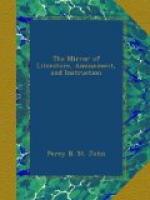Relations mix not kindly; shun
Inviting brothers; sire and son
Is not a wise selection:
Too intimate, they either jar
In converse, or the evening mar
By mutual circumspection.
Lawyers are apt to think the view
That interests them must interest you;
Hence they appear at table
Or supereloquent, or dumb,
Fluent as nightingales, or mum
As horses in a stable.
When men amuse their fellow guests
With Crank and Jones, or Justice Best’s
Harangue in Dobbs and Ryal—
The host, beneath whose roof they sit,
Must be a puny judge of wit,
Who grants them a new trial.
Shun technicals in each extreme,
Exclusive talk, whate’er the theme,
The proper boundary passes:
Nobles as much offend, whose clack’s
For ever running on Almack’s,
As brokers on molasses.
I knew a man, from glass to delf,
Who talk’d of nothing but himself,
’Till check’d
by a vertigo;
The party who beheld him “fluor’d,”
Bent o’er the liberated board,
And cried, “Hic jacet
ego.”
Some aim to tell a thing that hit
Where last they dined; what there was
wit
Here meets rebuffs and crosses.
Jokes are like trees; their place of birth
Best suits them; stuck in foreign earth,
They perish in the process.
Ah! Merriment! when men entrap
Thy bells, and women steal thy cap,
They think they have trepann’d
thee.
Delusive thought! aloof and dumb,
Thou wilt not at a bidding come,
Though Royalty command thee.
The rich, who sigh for thee—the
great,
Who court thy smiles with gilded plate,
But clasp thy cloudy follies:
I’ve known thee turn, in Portman-square,
From Burgundy and Hock, to share
A pint of Port at Dolly’s.
Races at Ascot, tours in Wales,
White-bait at Greenwich ofttimes fail,
To wake thee from thy slumbers.
E’en now, so prone art thou to fly,
Ungrateful nymph! thou’rt fighting shy
Of these narcotic numbers.
Ibid.
* * * * *
SELECT BIOGRAPHY
LEDYARD THE TRAVELLER.
John Ledyard, by birth an American, was, in all respects, from the habits of his life, a citizen of the world. He was born at a small village called Groton, in Connecticut, on the banks of the Thames; his father was a captain in the West Indian trade, but died young, leaving a widow and four children, of whom John was the eldest; his mother is described as “a lady of many excellences of mind and character, beautiful in person, well informed, resolute, generous, amiable, kind, and, above all, eminent for piety and the religious virtues.” Her little property, it seems, was lost through fraud or neglect, and the widowed mother, with her four infant children, thrown destitute upon the world.




